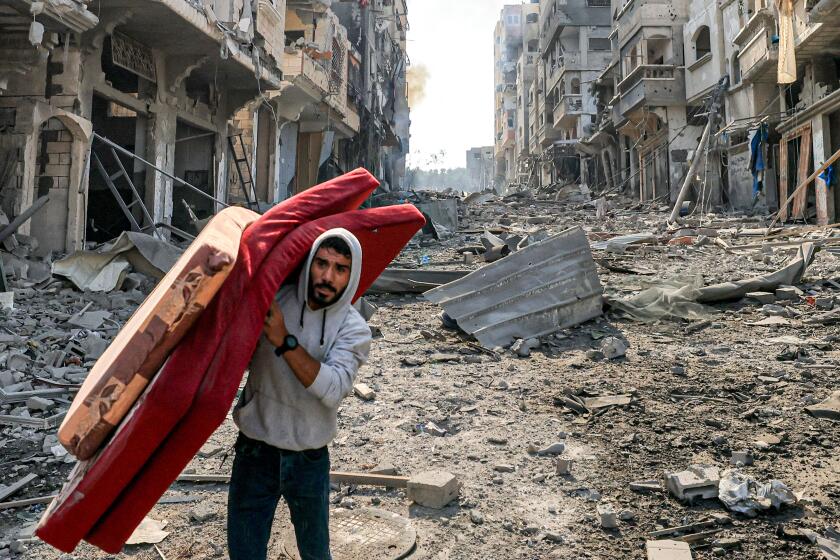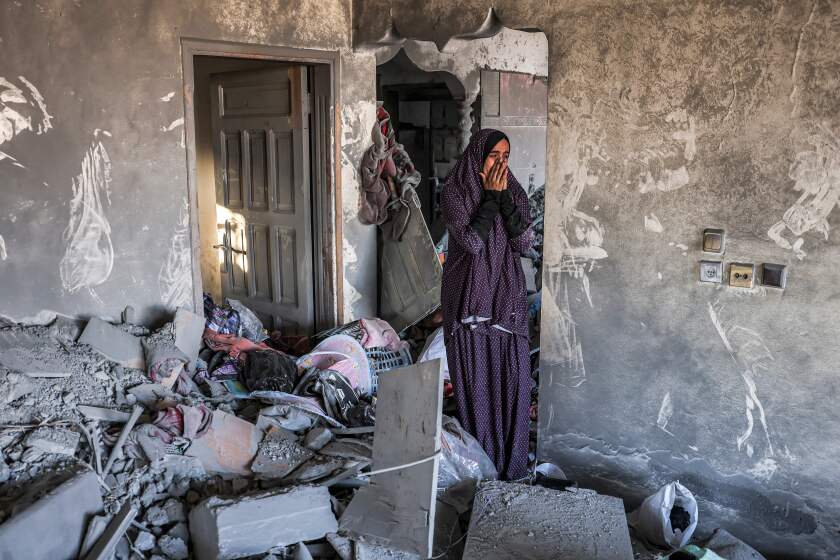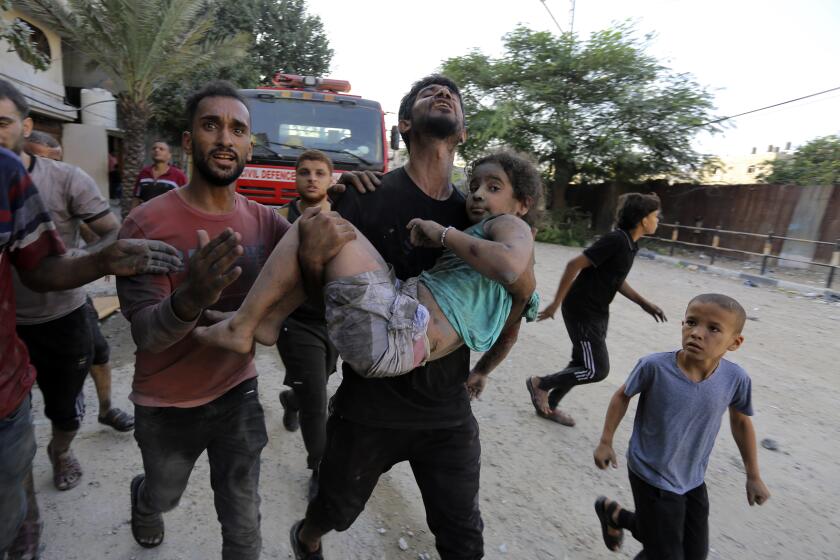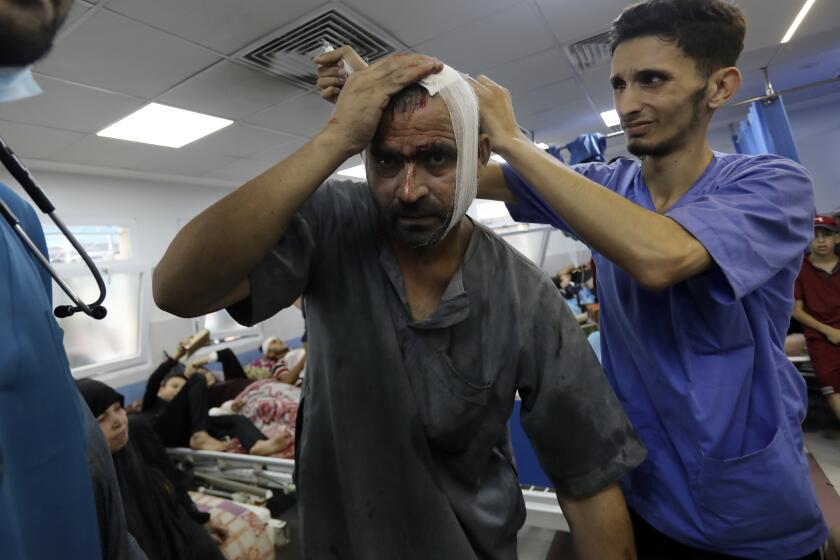Opinion: Why does Israel have so many Palestinians in detention and available to swap?
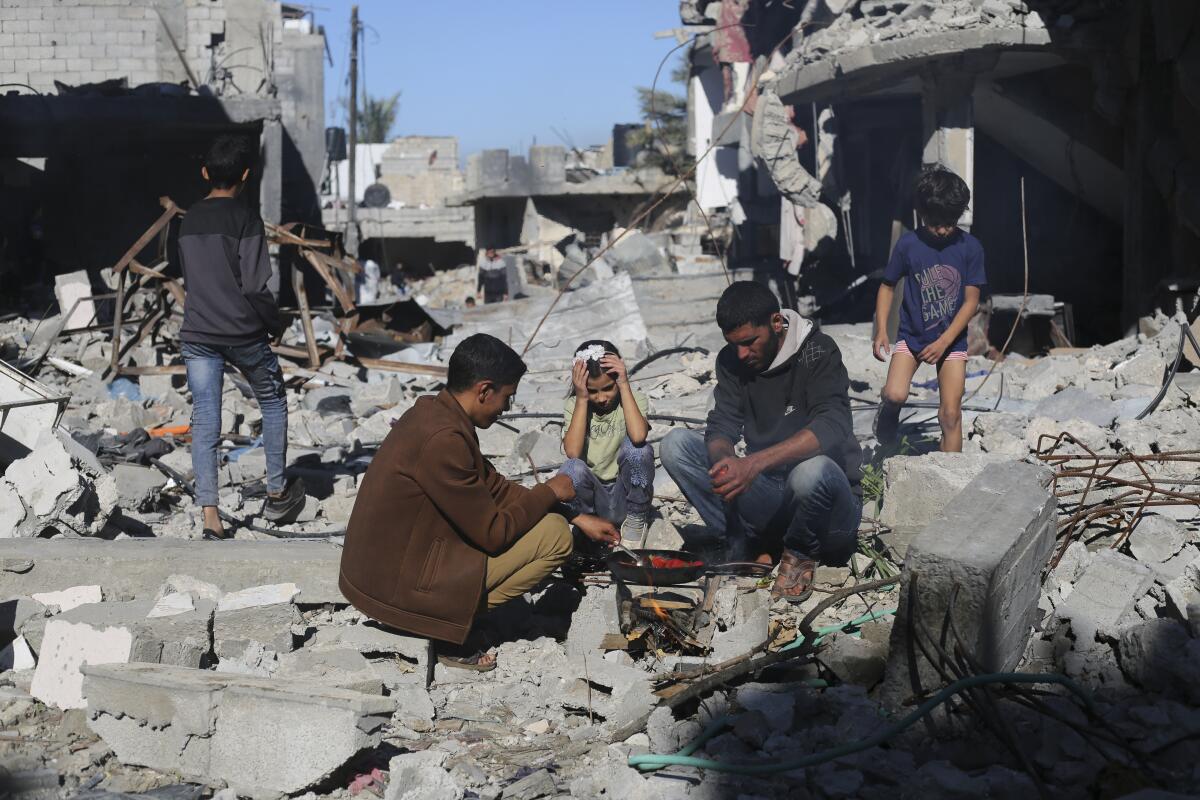
- Share via
The last week has seen, as of Nov. 28, the release of 69 civilians held hostage in Gaza in exchange for 180 Palestinian prisoners as part of a short-term cease-fire agreement between Israeli authorities and Palestinian armed groups.
While many have rightly hailed the release of civilians held hostage by Hamas after the killings of hundreds of Israelis and other civilians on Oct. 7 — hostage-taking is a war crime — less attention has been focused on why exactly Israel has so many Palestinians in detention and available to trade. And less still on how they got there.
The current truce is an important step. But the U.S. government should join in global calls for a cease-fire in Gaza.
As of Nov. 1, Israeli authorities held nearly 7,000 Palestinians from the occupied territory in detention for alleged security offenses, according to the Israeli human rights organization HaMoked. Far more Palestinians have been arrested since the Oct. 7 attacks in Israel than have been released in the last week. Among those being held are dozens of women and scores of children.
The majority have never been convicted of a crime, including more than 2,000 of them being held in administrative detention, in which the Israeli military detains a person without charge or trial. Such detention can be renewed indefinitely based on secret information, which the detainee is not allowed to see. Administrative detainees are held on the presumption that they might commit an offense at some point in the future. Israeli authorities have held children, human rights defenders and Palestinian political activists, among others, in administrative detention, often for prolonged periods.
Imagining possible futures beyond Israel’s Jewish supremacy is a political act for me, rooted in my people’s history.
The large number of Palestinian detainees is primarily the result of separate criminal justice systems Israeli authorities maintain in the occupied territory. The nearly 3 million Palestinians who live in the occupied West Bank, excluding East Jerusalem, are ruled by military law and prosecuted in military courts. By contrast, the nearly half a million Israeli settlers in the West Bank are governed under civil and criminal law and tried in Israeli civil courts. Discrimination pervades every aspect of this system.
Under military law, Palestinians can be held for up to eight days before they must see a judge — and then, only a military judge. Yet, under Israeli law, a person has to be brought before a judge within 24 hours of being arrested, which can be extended to 96 hours when authorized in extraordinary cases.
Palestinians can be jailed for participating in a gathering of merely 10 people without a permit on any issue “that could be construed as political,” while settlers can demonstrate without a permit unless the gathering exceeds 50 people, takes place outdoors and involves “political speeches and statements.”
The doctors I’ve worked with to build an advanced pediatrics system in Gaza now find that dream shattered. Children can’t get even the most basic care.
In short, Israeli settlers and Palestinians live in the same territory, but are tried in different courts under different laws with different due process rights and face different sentences for the same offense. The result is a large and growing number of Palestinians imprisoned without basic due process.
Discrimination also pervades the treatment of children. Israeli civil law protects children against nighttime arrests, provides the right to have a parent present during interrogations and limits the amount of time children may be detained before being able to consult a lawyer and to be presented before a justice.
Israeli authorities, however, regularly arrest Palestinian children during nighttime raids, interrogate them without a guardian present, hold them for longer periods before bringing them before a judge and hold those as young as 12 in lengthy pretrial detention. The Assn. for Civil Rights in Israel found in 2017 that authorities kept 72% of Palestinian children from the West Bank in custody until the end of proceedings, but only 17.9% of children in Israel.
Israel’s quest to root out Hamas has inflicted indiscriminate death and destruction on Gaza and Palestinian civilians. Humanitarian pauses are no longer enough.
While the law of occupation permits administrative detention as a temporary and exceptional measure, Israel’s sweeping use of administrative detention on the Palestinian population, more than a half-century into an occupation with no end in sight, far exceeds what the law authorizes.
Even those charged with a crime are routinely deprived of due process rights in military courts. Many of those convicted and serving time for “security offenses” (2,331 people as of Nov. 1) accepted plea bargains to avoid prolonged pretrial detention and sham military trials, which have a nearly 100% conviction rate against Palestinians.
Beyond the lack of due process, Israeli authorities have for decades mistreated and tortured Palestinian detainees. More than 1,400 complaints of torture, including painful shackling, sleep deprivation and exposure to extreme temperatures, by Shin Bet, Israel’s internal security service, have been filed with Israel’s Justice Ministry since 2001.
These complaints have resulted in a total of three criminal investigations and no indictments, according to the Public Committee Against Torture, an Israeli rights group. The group Military Court Watch reported that, in 22 cases of detention of Palestinian children they documented in 2023, 64% said they were physically abused and 73% were strip searched by Israeli forces while in detention.
Palestinian rights groups have reported a spike in arrests and deterioration in the conditions of Palestinian prisoners prior to Oct. 7, including violent raids, retaliatory prison transfers and isolation of prisoners, less access to running water and bread and fewer family visits. The trends have worsened since.
Discrimination in detention and imprisonment is just one aspect of systematic oppression, which underlies Israeli authorities’ crimes against humanity of apartheid and persecution against Palestinians, as Human Rights Watch and other Israeli, Palestinian, and international human rights organizations have found.
Israeli authorities should end their discriminatory, abusive detention practices, whether the exchanges continue or not.
Omar Shakir is the Israel and Palestine Director at Human Rights Watch.
More to Read
A cure for the common opinion
Get thought-provoking perspectives with our weekly newsletter.
You may occasionally receive promotional content from the Los Angeles Times.
